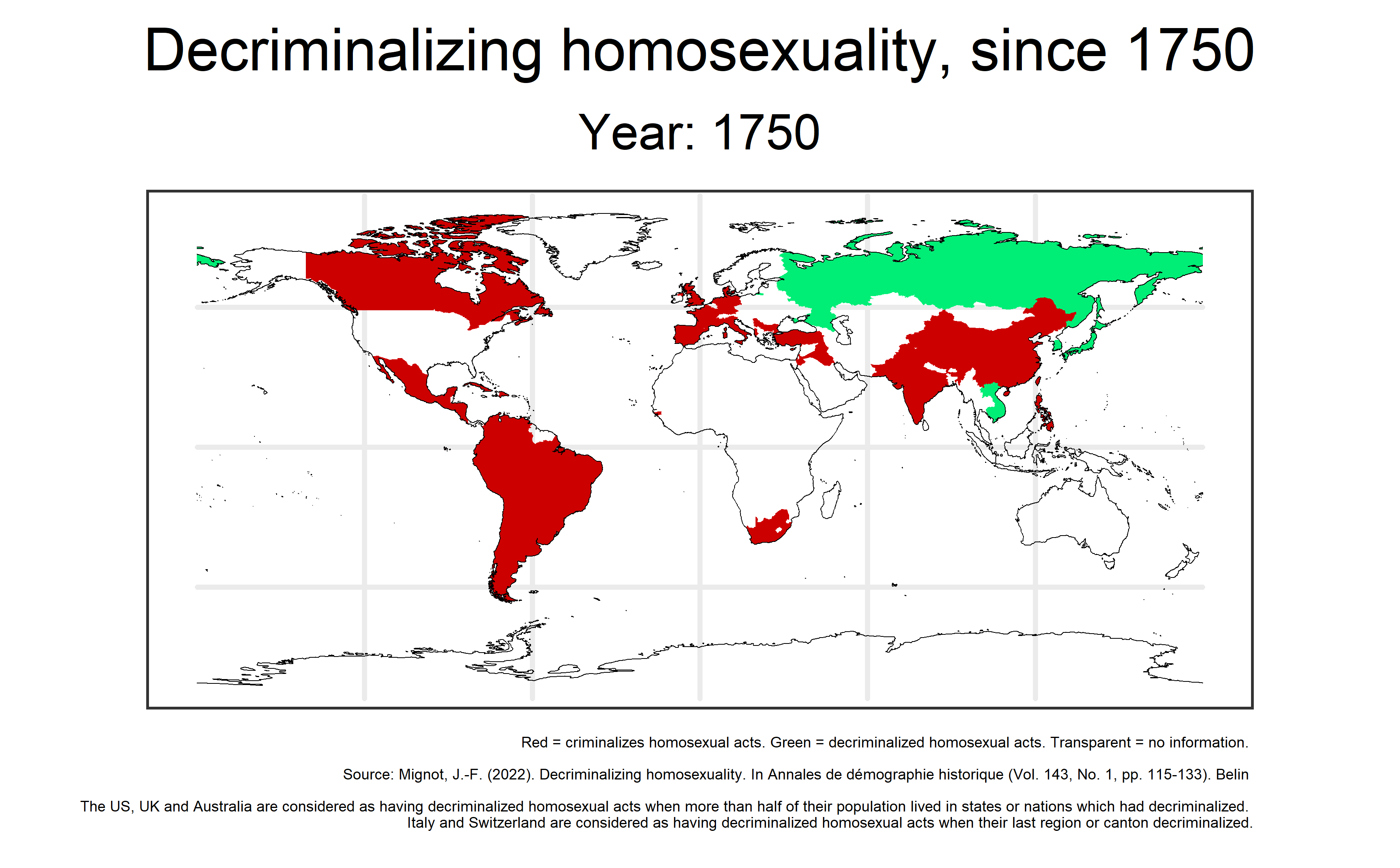Decriminalization of homosexuality since the 18th century

More and more people live in countries that have decriminalized homosexual relations, from 11% of the global population in the late 18th century to 79% in the early 21st century. However, as Jean-François Mignot observes, due to faster population growth in criminalizing countries, this trend may soon reverse.
Today, around 21% of the world’s population live in countries where homosexual acts (between consenting adults in private) are a criminal offence punished with fines, corporal punishment, imprisonment or even the death penalty. This implies that around 79% of humans reside in nations where homosexual acts have been decriminalized.
How did we get there? Where, when and how have homosexual relations been decriminalized in the world since the Age of Enlightenment? And is the proportion of humans living in a country which has decriminalized homosexuality more likely to increase, or decrease, in the foreseeable future?
Historical data on the legality of homosexual acts – and historical population numbers as well as UN population projections until 2100 – were gathered on 203 present-day countries, allowing us to answer these questions.
The first wave of decriminalization, from the French Revolution
In the late 18th century, when just 11% of the world’s population lived in countries where homosexual acts were not a criminal offense, France became the first country to decriminalize these practices. The French Penal Code of 1791, drafted in the liberal spirit of the Enlightenment, abolished a “crowd of imaginary crimes”, including sodomy, and the French Penal Code of 1810, which was applied in Napoleonic Europe, inspired the first wave of decriminalization in Western Europe (and, indirectly, in the French, Spanish, Dutch and Belgian colonies), Latin America and the Ottoman Empire. However, in the 19th century fewer than 25% of humans lived in a country where homosexual relations were not illegal. Most notably, Great Britain criminalized “buggery” at home and disseminated this criminalization across its immense empire in Africa, the Middle East, Asia and Oceania.
The second wave of decriminalization, since the 1960s
From 1950 to 2020, the proportion of countries where homosexual acts were not a criminal offense almost doubled, from 35 % to 66 %. This second wave, beginning in the 1960s in Western and Northern Europe and Canada, then spread to Oceania, Eastern Europe and finally Asia. It was driven by liberalization of public opinion and social movements. In India, homosexual acts were decriminalized by the Supreme Court decision Navtej Singh Johar v. Union of India (2018). Africa is the only continent where, since 1950, the decriminalization movement has had relatively little success.

Recriminalization in the Muslim world?
In contrast to these trends, in countries with a Muslim majority, fewer people now live in a country where homosexual acts are not illegal; the proportion fell from 47% in 1950 to 41% in 2020. In addition, since the 1990s, several sub-state entities not included in the animated map have begun to criminalize homosexual acts or impose stricter penalties in the name of Islamic law (sharia). This is the case in provinces of southern Somalia; in the Chechen Republic of the Russian Federation (1996); in Indonesia in the province of Aceh (2002) and in the capital of South Sumatra (2006); and in the northern states of Nigeria (1999). Punishments for homosexual acts are also especially harsh in a few Islamic-law states and sub-state entities.
The future of decriminalization
Relatively more humans are now legally free to engage in homosexual acts, but will this long-term trend continue? There are reasons to doubt it. First, the diffusion of religious fundamentalism, especially but not only in the Muslim world, may lead some countries to recriminalize homosexual acts. Second, countries where homosexual acts are currently illegal have higher fertility and will have faster population growth in the future than those where they are not criminalized today. This is why the share of humans who are legally free to engage in homosexual acts will likely decrease, unless, of course, attitudes and laws change in a large enough number of sufficiently populated countries where homosexuality is currently outlawed.
References
Mignot, J. F. (2022). Decriminalizing homosexuality. In Annales de démographie historique (Vol. 143, No. 1, pp. 115-133). Belin. https://hal.science/hal-03778162v1/document